The best thing about blogging for me is the feedback I get from readers’ comments and it was one such comment that inspired me to write this post. A few days ago I received an informative comment from aussieh in response to a post about the Grant Thornton Report (http://wp.me/p3mYc5-5J ) which made my blood run cold. In this comment aussieh drew my attention to this
The US/EU Free Trade Agreement, which David Cameron identified as a priority in his chairing of the G8 this year, was given the go-ahead by US President Obama and EU President Barroso in January. One of the key aims of this Free Trade Agreement is to give international corporations legal rights to access governments’ public services budgets…
This framework means that publicly funded English health services will be obliged to tender out contracts. Large transnational corporations will have a competitive advantage in the bidding process…
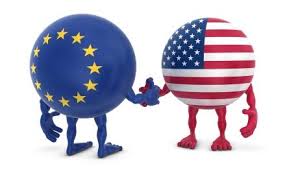 Legal rights to access our public services budgets? What does that mean? And why would our Prime Minister if, as he’s endlessly claiming, he always stands up for ‘the national interest’, want to make it a priority to open up our public services to multinational corporations who have NO interest in how we organise our affairs other than how they can ruthlessly exploit it to maximise their share price. We know that and unless he’s totally brain dead, he must know that too. Its not as if they don’t have loads of form for it. We all saw what happened to that sweatshop in Bangladesh recently. Who exactly is calling the shots here? And just how did it happen to get this way in the first place?
Legal rights to access our public services budgets? What does that mean? And why would our Prime Minister if, as he’s endlessly claiming, he always stands up for ‘the national interest’, want to make it a priority to open up our public services to multinational corporations who have NO interest in how we organise our affairs other than how they can ruthlessly exploit it to maximise their share price. We know that and unless he’s totally brain dead, he must know that too. Its not as if they don’t have loads of form for it. We all saw what happened to that sweatshop in Bangladesh recently. Who exactly is calling the shots here? And just how did it happen to get this way in the first place?
I definitely needed to find out more about this…
 While searching on Google Scholar I found an academic article by Upendra D Acharya from Gonzaga University School of Law in Washington. The article, published in the Boston College Law Review on 23rd May this year, told me everything I needed to know to understand why our public services are in danger of being eaten up by multinational sharks. Its title is “Globalization and Hegemony Shift: Are States Merely Agents of Corporate Capitalism?” and is freely accessible through Law Journals at Digital Commons. I’ll summarise it below but if you want to read it for yourself the link is here,
While searching on Google Scholar I found an academic article by Upendra D Acharya from Gonzaga University School of Law in Washington. The article, published in the Boston College Law Review on 23rd May this year, told me everything I needed to know to understand why our public services are in danger of being eaten up by multinational sharks. Its title is “Globalization and Hegemony Shift: Are States Merely Agents of Corporate Capitalism?” and is freely accessible through Law Journals at Digital Commons. I’ll summarise it below but if you want to read it for yourself the link is here,
Acharya sums up the state of affairs as it now stands today by saying,
“corporate capitalism has converted globalization into a profit-making venture. All states…have begun to behave as agents of corporate capitalism. We are now in a new world order of hegemony shift from states to corporate capitalism. In this new world order, states are functioning as a conduit for corporate capitalism. The theory of global governance has been based on market and technology, particularly since the 1990s. Due to corporate capitalism-induced, market-driven globalization, we are beginning to enter an era of post-human society with a decline or an absence of aspirational and emotional human elements. States have become soft power and corporate capitalism has become hard power in the system of international law and order. The notion of peace and the conduct of war have become the primary business of corporations while states facilitate and sacrifice their resources and citizens for the interests of corporate capitalism.”
‘Sacrifice their resources and citizens for the interests of global capitalism’? Well, Cameron certainly seems to be doing that. But how did we get into this mess?
 In order to explain how we ended up with a globalised world under the thumb of powerful corporations Acharya takes us way back to 1648 and what’s known as The Peace of Westphalia.
In order to explain how we ended up with a globalised world under the thumb of powerful corporations Acharya takes us way back to 1648 and what’s known as The Peace of Westphalia.
According to Wikipedia, the “Peace of Westphalia was a series of peace treaties signed between May and October 1648 in Osnabrück and Münster. These treaties ended the Thirty Years’ War (1618–1648) in the Holy Roman Empire, and the Eighty Years’ War (1568–1648) between Spain and the Dutch Republic, with Spain formally recognizing the independence of the Dutch Republic.” This was the beginning of a new political era in Europe because it was then that the idea of the sovereign or nation state was born.
It was hoped that by establishing clear borders between the different countries, each with their own ruler and forbidding interference into another nation’s affairs that the almost constant wars that had been fought over territory prior to these agreements would end.
In effect this was the first international law.
 As technology advanced in Britain and Europe and along with it industry and trade, these powerful states were able to impose their values on weaker countries disrupting their value systems so they could exploit their natural resources. Colonial rule was imposed bringing Western law with it, but denying these colonised countries the equal right to sovereignty enjoyed by their colonisers. Business benefited from this massive looting – the Dutch East India Company, for instance, made a huge fortune from the spice trade for two centuries, setting up ports as trading bases and taking over surrounding land.
As technology advanced in Britain and Europe and along with it industry and trade, these powerful states were able to impose their values on weaker countries disrupting their value systems so they could exploit their natural resources. Colonial rule was imposed bringing Western law with it, but denying these colonised countries the equal right to sovereignty enjoyed by their colonisers. Business benefited from this massive looting – the Dutch East India Company, for instance, made a huge fortune from the spice trade for two centuries, setting up ports as trading bases and taking over surrounding land.
All this was considered to be legal by the looters because they made the laws that worked in their favour and imposed them on the weak states, by force if necessary.
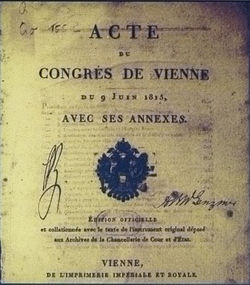 According to Acharya the next big landmark in the development of international law was the Congress of Vienna. Wikipedia tells us that the “Congress of Vienna was a conference of ambassadors of European states chaired by Austrian statesman Klemens Wenzel von Metternich, and held in Vienna from September 1814 to June 1815. This objective resulted in the redrawing of the continent’s political map, establishing the boundaries of France, the Duchy of Warsaw, the Netherlands, the states of theRhine, the German Kingdom of Saxony, and various Italian territories, and the creation of spheres of influence through which Austria, Britain, France and Russia brokered local and regional problems.”
According to Acharya the next big landmark in the development of international law was the Congress of Vienna. Wikipedia tells us that the “Congress of Vienna was a conference of ambassadors of European states chaired by Austrian statesman Klemens Wenzel von Metternich, and held in Vienna from September 1814 to June 1815. This objective resulted in the redrawing of the continent’s political map, establishing the boundaries of France, the Duchy of Warsaw, the Netherlands, the states of theRhine, the German Kingdom of Saxony, and various Italian territories, and the creation of spheres of influence through which Austria, Britain, France and Russia brokered local and regional problems.”
Once again, this conference for the powerful came after a long period of wars notably the French Revolutionary Wars and the Napoleonic Wars. Obviously, the Peace of Westphalia hadn’t stopped those with power from fighting over territory and when all the killing stopped they had to sit down yet again and talk to come to some agreement about borders and lay down a few more rules. Can you see a pattern emerging here?
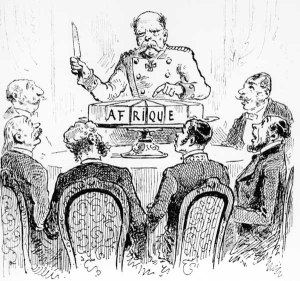 Seventy years later in 1885 the glorious leaders of Europe were at it again at the Berlin Conference, aka the Congo Conference. This time they were dividing up Africa between them, like a bunch of elite schoolboys arguing over a stolen cake. Once again they were laying down the rule of law to regulate the colonisation of a continent rich in natural resources with not a single African citizen present! As Wikipedia puts it the conference was “called for by Portugal and organized by Otto von Bismarck, first Chancellor of Germany, its outcome, the General Act of the Berlin Conference, can be seen as the formalization of the Scramble for Africa. The conference ushered in a period of heightened colonial activity by European powers, while simultaneously eliminating most existing forms of African autonomy and self-governance.” Unbelievable!
Seventy years later in 1885 the glorious leaders of Europe were at it again at the Berlin Conference, aka the Congo Conference. This time they were dividing up Africa between them, like a bunch of elite schoolboys arguing over a stolen cake. Once again they were laying down the rule of law to regulate the colonisation of a continent rich in natural resources with not a single African citizen present! As Wikipedia puts it the conference was “called for by Portugal and organized by Otto von Bismarck, first Chancellor of Germany, its outcome, the General Act of the Berlin Conference, can be seen as the formalization of the Scramble for Africa. The conference ushered in a period of heightened colonial activity by European powers, while simultaneously eliminating most existing forms of African autonomy and self-governance.” Unbelievable!
Now we know where racism comes from. It makes me ashamed to be white.
 Following the First World War the powers that be set up the League of Nations. This arose out of the Paris Peace Conference that put an end to the war and was a forerunner to the United Nations. Wikipedia says that ” Its primary goals, as stated in its Covenant, included preventing wars through collective security and disarmament, and settling international disputes through negotiation and arbitration.Other issues in this and related treaties included labour conditions, just treatment of native inhabitants, human and drug trafficking, arms trade, global health, prisoners of war, and protection of minorities in Europe. At its greatest extent from 28 September 1934 to 23 February 1935, it had 58 members.”
Following the First World War the powers that be set up the League of Nations. This arose out of the Paris Peace Conference that put an end to the war and was a forerunner to the United Nations. Wikipedia says that ” Its primary goals, as stated in its Covenant, included preventing wars through collective security and disarmament, and settling international disputes through negotiation and arbitration.Other issues in this and related treaties included labour conditions, just treatment of native inhabitants, human and drug trafficking, arms trade, global health, prisoners of war, and protection of minorities in Europe. At its greatest extent from 28 September 1934 to 23 February 1935, it had 58 members.”
 So here we can see the further globalisation of international law and its interesting that issues like labour conditions, health and just treatment of ‘natives’ were included. Had our great leaders suddenly become philanthropic? Or was their collective elitist mind concentrating on the recent Russian Revolution and the greater tendency to protest by the unwashed masses under their thumb?
So here we can see the further globalisation of international law and its interesting that issues like labour conditions, health and just treatment of ‘natives’ were included. Had our great leaders suddenly become philanthropic? Or was their collective elitist mind concentrating on the recent Russian Revolution and the greater tendency to protest by the unwashed masses under their thumb?
As far as the colonies were concerned these were to become sovereign states in their own right – eventually – after a long drawn out process of first becoming Mandates which effectively meant they were still made to accept theirs master’s laws. Sometimes called ‘moral colonialism’ the mandate system was built on the arrogant assumption that there was a natural hierarchy of nations and the self-styled superior ones such as Britain and France and the USA had a moral duty to guide the ‘backward’ states in becoming independent. Unsurprisingly, there was no mention by this bunch of thieving warlords of returning looted goods to their rightful owners.
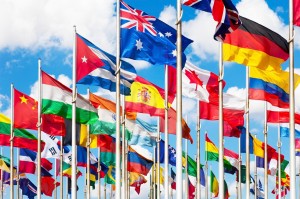 After a mere 20 years the masters of war were at it again after Hitler invaded Poland and all hell broke loose, this time with the greater destructive force of new technologies of killing beyond the wildest dreams of the princes who made the fragile Peace of Westphalia. The shock of not one, but two atom bombs dropped on Japan causing horrific destruction at the mere flick of a switch ended the madness and gave birth to the United Nations.
After a mere 20 years the masters of war were at it again after Hitler invaded Poland and all hell broke loose, this time with the greater destructive force of new technologies of killing beyond the wildest dreams of the princes who made the fragile Peace of Westphalia. The shock of not one, but two atom bombs dropped on Japan causing horrific destruction at the mere flick of a switch ended the madness and gave birth to the United Nations.
 According to Wikipedia the UN “has six principal organs: the General Assembly, the Security Council (for deciding certain resolutions for peace and security); the Economic and Social Council (for assisting in promoting international economic and social cooperation and development); the Secretariat (for providing studies, information, and facilities needed by the UN); the International Court of Justice (the primary judicial organ); and the United Nations Trusteeship Council (which is currently inactive). Other prominent UN System agencies include the World Health Organization (WHO), the World Food Programme (WFP) and United Nations Children’s Fund (UNICEF).”
According to Wikipedia the UN “has six principal organs: the General Assembly, the Security Council (for deciding certain resolutions for peace and security); the Economic and Social Council (for assisting in promoting international economic and social cooperation and development); the Secretariat (for providing studies, information, and facilities needed by the UN); the International Court of Justice (the primary judicial organ); and the United Nations Trusteeship Council (which is currently inactive). Other prominent UN System agencies include the World Health Organization (WHO), the World Food Programme (WFP) and United Nations Children’s Fund (UNICEF).”
You can imagine how much more complicated international law must have got by now from its humble origins in 1685. And you can add to this a few other international legal players such as the IMF and the World Bank and the one at the very heart of the Free Trade Agreement that David Cameron tells us is so very important for our economic survival, the World Trade Organisation.
 Again I turn to Wikipedia for an description of what the WTO is and does,
Again I turn to Wikipedia for an description of what the WTO is and does,
“The World Trade Organization (WTO) is an organization that intends to supervise and liberalize international trade. The organization officially commenced on 1 January 1995 under the Marrakech Agreement, replacing the General Agreement on Tariffs and Trade (GATT), which commenced in 1948. The organization deals with regulation of trade between participating countries; it provides a framework for negotiating and formalizing trade agreements, and a dispute resolution process aimed at enforcing participants’ adherence to WTO agreements, which are signed by representatives of member governments and ratified by their parliaments. Most of the issues that the WTO focuses on derive from previous trade negotiations, especially from the Uruguay Round (1986–1994).”
 There isn’t enough time or space to go into the convoluted regulations and rules imposed internationally by the WTO but the bit that matters to the NHS is the one that opens up nations’ public services to so-called free trade agreements, the GATS. The basic WTO principle of ‘most favoured nation’ (MFN) applies to GATS as well. Its a bit like the ‘ any qualified provider’ rule in the Health Bill and regulates who should be given contracts. And with the recent news that US health giant HSA have got in on the NHS act we can see already the kind of puppet masters pulling the Coalition’s strings. The members of the WTO agree to accord MFN status to each other and MFN is one of the cornerstones of WTO trade law.
There isn’t enough time or space to go into the convoluted regulations and rules imposed internationally by the WTO but the bit that matters to the NHS is the one that opens up nations’ public services to so-called free trade agreements, the GATS. The basic WTO principle of ‘most favoured nation’ (MFN) applies to GATS as well. Its a bit like the ‘ any qualified provider’ rule in the Health Bill and regulates who should be given contracts. And with the recent news that US health giant HSA have got in on the NHS act we can see already the kind of puppet masters pulling the Coalition’s strings. The members of the WTO agree to accord MFN status to each other and MFN is one of the cornerstones of WTO trade law.
However, UN Members may introduce temporary exemptions to this rule. The overall goal of GATS is to remove barriers to trade but members are free to choose which sectors are to be progressively “liberalised”, i.e. marketised and privatised, which mode of supply would apply to a particular sector, and to what extent liberalisation will occur over a given period of time.
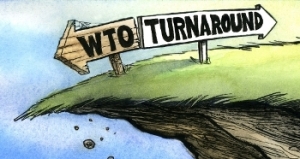 But once they decide which service to include, Members’ commitments are governed by a “ratchet effect”, meaning that commitments are one-way and are not to be wound back once entered into. The reason for this rule is supposed to be to create a stable trading climate. However, Article XXI does allow Members to withdraw commitments, and so far two members have exercised this option (USA and EU). In November 2008, Bolivia notified that it will withdraw its health services commitments.
But once they decide which service to include, Members’ commitments are governed by a “ratchet effect”, meaning that commitments are one-way and are not to be wound back once entered into. The reason for this rule is supposed to be to create a stable trading climate. However, Article XXI does allow Members to withdraw commitments, and so far two members have exercised this option (USA and EU). In November 2008, Bolivia notified that it will withdraw its health services commitments.
So. if Bolivia can do it why can’t we?!!!
 Acharya mentioned that globalisation and the rise of corporate capitalism really took after at the end of the Cold War when George Bush senior announced the dawn of a New World Order. In reality he was announcing the fact that multinational corporations and their private vested interests were taking over through the immense lobbying power they have to influence national governments. Democracy was given a death sentence.
Acharya mentioned that globalisation and the rise of corporate capitalism really took after at the end of the Cold War when George Bush senior announced the dawn of a New World Order. In reality he was announcing the fact that multinational corporations and their private vested interests were taking over through the immense lobbying power they have to influence national governments. Democracy was given a death sentence.
 Since Thatcher and Reagan neoliberal governments have danced to the privatise -everything – that – moves tune of these corporate giants. We, the people, have fought against it all over the world and lost more and more ground as many of our so-called representatives are bought off in return for keeping us uninformed, docile and poor enough to accept ever lower wages to work for these leviathans who pay as little tax as possible in return.
Since Thatcher and Reagan neoliberal governments have danced to the privatise -everything – that – moves tune of these corporate giants. We, the people, have fought against it all over the world and lost more and more ground as many of our so-called representatives are bought off in return for keeping us uninformed, docile and poor enough to accept ever lower wages to work for these leviathans who pay as little tax as possible in return.
 These giants want to make profit from everything we need for our basic survival from water supplies to crops and will also profit from the sickness they create by taking over our health services. They engineer wars and sell arms to both sides then profit from the destruction through rebuilding contracts. They are the Masters of War since many armies are now private. You must have noticed how all through history the evolution of this world domination has depended on war.
These giants want to make profit from everything we need for our basic survival from water supplies to crops and will also profit from the sickness they create by taking over our health services. They engineer wars and sell arms to both sides then profit from the destruction through rebuilding contracts. They are the Masters of War since many armies are now private. You must have noticed how all through history the evolution of this world domination has depended on war.
How much longer are we going to take this?


